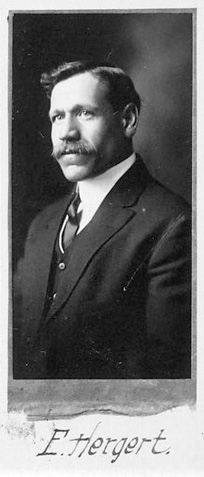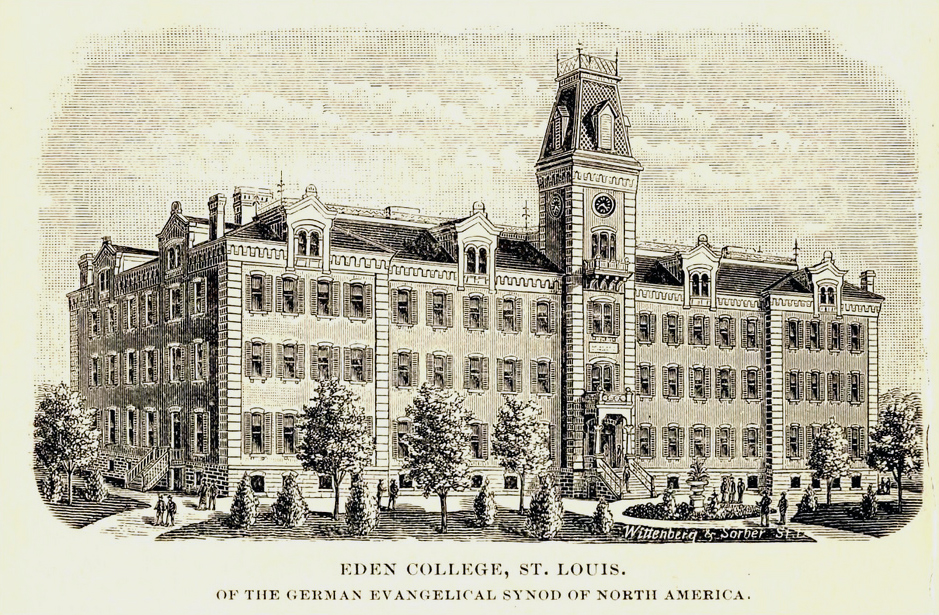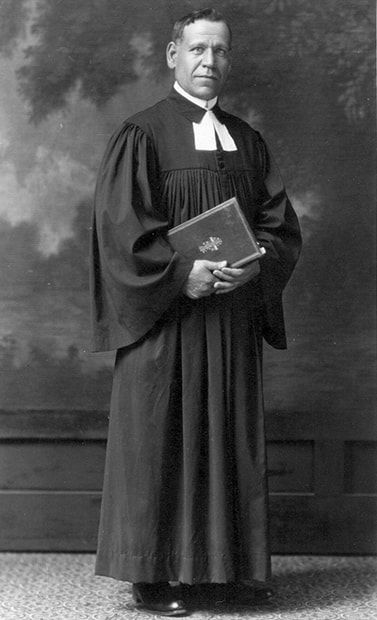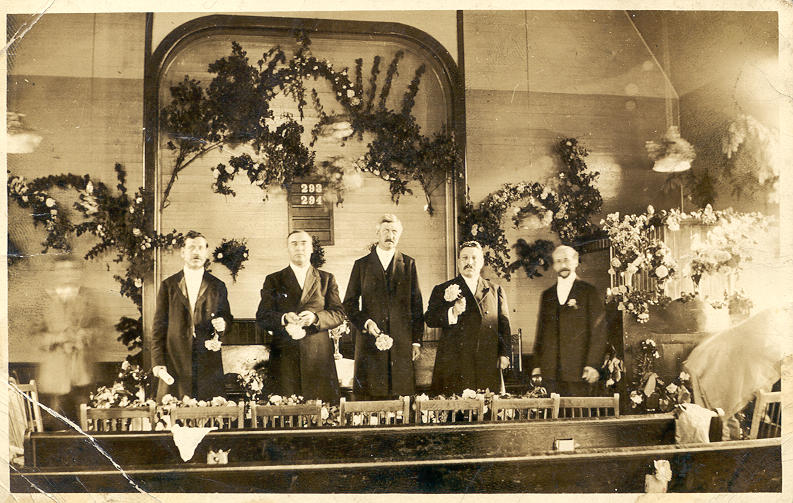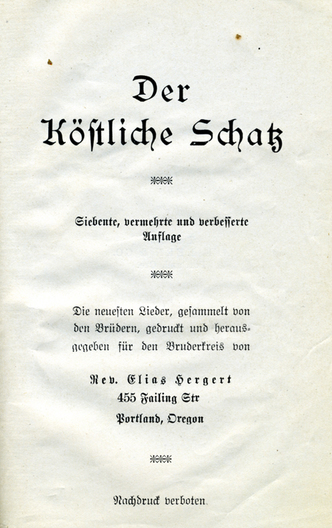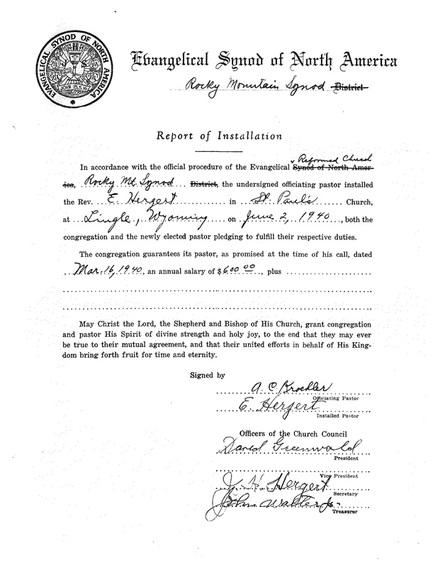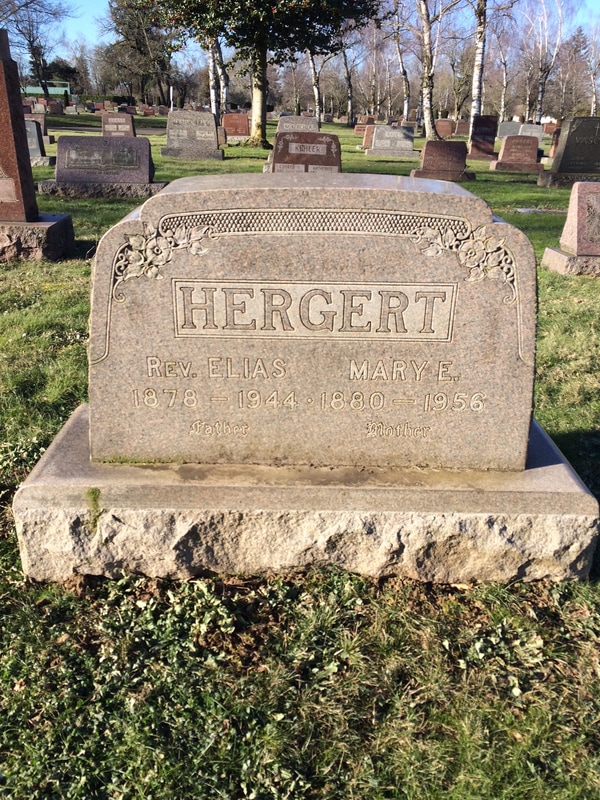Rev. Elias Hergert
Elias (Eli) Hergert was born June 22, 1878, in Brunnental, Russia, the son of Elias Hergert (born 1835) and Maria Catharina Dietz (born 1837), both born in the colony of Walter. Elias and Maria Catharina had at least nine children, most of whom immigrated to the United States and settled in Northeast Portland.
Elias was confirmed in Brunnental in 1893 by Pastor Stuber. In 1900, he married Maria Elisabeth (Mary) Liebrecht. Elias Hergert worked as a teacher in Omsk, Russia (in Siberia). After a diphtheria epidemic in 1907 resulted in the death of three children, Elias and Mary decided to migrate to America. Elias's brother Jacob immigrated to the United States in 1893. He served as pastor of the St. Pauls Evangelical and Reformed Church, which he founded in 1904. Elias and Mary settled in Portland, and a son, Elias, was born on August 2, 1910.
Elias initially worked as a salesman. He was not fully satisfied with this work and strongly desired to become a minister.
Elias was confirmed in Brunnental in 1893 by Pastor Stuber. In 1900, he married Maria Elisabeth (Mary) Liebrecht. Elias Hergert worked as a teacher in Omsk, Russia (in Siberia). After a diphtheria epidemic in 1907 resulted in the death of three children, Elias and Mary decided to migrate to America. Elias's brother Jacob immigrated to the United States in 1893. He served as pastor of the St. Pauls Evangelical and Reformed Church, which he founded in 1904. Elias and Mary settled in Portland, and a son, Elias, was born on August 2, 1910.
Elias initially worked as a salesman. He was not fully satisfied with this work and strongly desired to become a minister.
In 1912, Elias entered the Eden Theological Seminary in St. Louis, Missouri. The Eden Seminary was established in 1850 by German pastors serving the American frontier. These pastors soon formed the German Evangelical Synod of North America, and all theological courses were taught in German through the early 1900s. The German Evangelical Synod served primarily German Protestant congregations of mixed Lutheran and Reformed heritage. Although the ethos of the Synod was largely pietistic Lutheran, it was not a Lutheran denomination. Despite this, it was not unusual for congregations to use the word "Lutheran" in their name. Throughout his ministry work, Rev. Hergert only served congregations that were members of the German Evangelical Synod.
Following Rev. Hergert's graduation in 1913, he was ordained on his birthday in the newly founded St. John's Evangelical and Reformed Church (known as the Peace Church or the German Evangelical Reformed Church) in the Sellwood district of Portland. Rev. Hergert served this congregation until 1916. This church was located at 610 Tacoma Avenue (now 1522 SE Tacoma Street). The building remains in use as a private residence (2015).
A son, Solomon, was born to Elias and Mary on May 3, 1915.
A son, Solomon, was born to Elias and Mary on May 3, 1915.
In August 1916, Rev. Hergert resigned from his post at the German Evangelical Church and accepted a call to serve as a home missionary in Sheridan, Wyoming. An article in The Morning Oregonian noted that Rev. Hergert was very popular with his congregation, and they regretted losing him. From his home base in Sheridan, Rev. Hergert also served missions in Hardin, Montana, and Claremont, Wyoming. In 1918, Elias wrote the following article that was published in the German language newspaper Die Welt Post:
In 1916 I went with the Evangelical Synod of North America as a missionary to the states of Wyoming, Montana and Portland, Oregon. My home was Sheridan Wyoming. In the spring of 1917, many German people moved to South Dakota, Montana and Washington. I then went to Hardin, Montana about 80 miles north of Sheridan.
In 1917, I was called to Okeene, Oklahoma. My brother, Pastor J. Hergert of Portland, Oregon took the call to Farmington, Washington for the Iowa Synod.
In 1918, Rev. Hergert was listed in the Hardin, Montana City Directory as pastor of the Evangelical Lutheran Church. When he first built the church, seven families attended. One year later, 35 families formed the congregation. Sometime in 1918, he was called to pastor the Evangelical Zion Church in Fort Collins, Colorado, and served there until 1925. In the first three years of his pastorate, the congregation increased in size from 65 to 175. Rev. Hergert recalled one great revival meeting in particular when 54 persons were converted.
A third son, Jacob, was born to Elias and Mary on August 22, 1918.
Rev. Hergert was called to Portland to serve the St. Pauls Evangelical and Reformed Church in Portland following the death of his brother, Rev. Jacob Hergert, in 1923, but he did not accept this call until 1925. Another brother, Heinrich Elias Hergert, was also living in Portland.
Rev. Hergert was one of the Portland pastors who helped lead the charitable efforts of the Volga Relief Society in the early 1920s. This organization raised funds to help family and friends in Russia who were facing starvation. Rev. Hergert wrote a poem about his home village of Brunnental, which served as a solicitation for funds.
A third son, Jacob, was born to Elias and Mary on August 22, 1918.
Rev. Hergert was called to Portland to serve the St. Pauls Evangelical and Reformed Church in Portland following the death of his brother, Rev. Jacob Hergert, in 1923, but he did not accept this call until 1925. Another brother, Heinrich Elias Hergert, was also living in Portland.
Rev. Hergert was one of the Portland pastors who helped lead the charitable efforts of the Volga Relief Society in the early 1920s. This organization raised funds to help family and friends in Russia who were facing starvation. Rev. Hergert wrote a poem about his home village of Brunnental, which served as a solicitation for funds.
In 1938, Rev. Hergert led an effort to enlarge and remodel the St. Pauls church. The addition created a new and larger sanctuary, and a steeple was placed above the relocated entry door, which was lowered to the ground level. On November 6, 1938, a Kirchweihfest was held at the church. The Kirchweihfest is an ancient religious festival and celebration traditionally held upon the consecration of a Christian church building.
Well-known throughout the Northwestern German Evangelical churches, Rev. Hergert organized evangelistic meetings in various places. He was an outstanding vocalist and hymn writer. He is probably best known for publishing his songbook, Der Köstliche Schatz (The Precious Treasures), which was printed in at least three editions and can still be purchased from a publisher in Germany (2013). This book was a supplementary hymnbook in many German Congregational churches.
Rev. Hergert served as pastor of St. Pauls Church from 1925 to 1939. On June 2, 1940, Rev. Hergert accepted a call to serve St. Pauls Evangelical and Reformed Church in Lingle, Wyoming, at an annual salary of $600. Pastor Hergert returned to Portland in 1943 on the advice of his physician to improve his health. Sadly, his condition did not improve, and he died in Portland on March 31, 1944.
A well-attended funeral was held on April 5th in the St. Pauls Evangelical and Reformed Church. Rev. Heinrich Hagelganz, a friend and fellow countryman of Rev. Hergert who served the Second German Congregational Church, preached in German while the local pastor spoke in English. Altogether, nine Lutheran pastors and six clergymen from neighboring German Congregational churches were in attendance. After the funeral, his body was taken to the Rose City Cemetery for burial. In his obituary, Rev. Carl Pfeiffer wrote:
His own compatriots will remember his name a long time via his pastoral works among themselves and through his publishing and often‑used songbook "Der Köstliche Schatz" (The Precious Treasures).
Although Rev. and Mrs. Hergert suffered the loss of three more children during their time in the United States, they did have four children who survived to adulthood: Elias Jr. (born 1910), Solomon (Sollie) (born in 1915), Jacob (Jake) (born in 1918), and Mary (Mrs. Joseph Greenwald born in 1922).
Sources
Hergert, Herbert L. "The Hergert Brothers." The Brunnental Village Newsletter, November 1998, pgs. 4-10.
Holl, Scott. Eden Theological Seminary Archives, 475 E. Lockwood Ave., St. Louis, MO 63119. July 2015.
Millar (née Schott), Virgina. "Memories of St. Pauls Evangelical Church." May 1, 2002.
Pfeiffer, Rev. Carl. "Obituary for Pastor Elias Hergert." Der Friedensbote, St. Louis, Missouri, April 30, 1944
"City News In Brief." The Morning Oregonian [Portland], August 29, 1916. pg. 9.
"Rev. Elias Hergert Proud of Reconstructed Church." The Oregonian [Portland], 1939.
Portland City Directories.
Holl, Scott. Eden Theological Seminary Archives, 475 E. Lockwood Ave., St. Louis, MO 63119. July 2015.
Millar (née Schott), Virgina. "Memories of St. Pauls Evangelical Church." May 1, 2002.
Pfeiffer, Rev. Carl. "Obituary for Pastor Elias Hergert." Der Friedensbote, St. Louis, Missouri, April 30, 1944
"City News In Brief." The Morning Oregonian [Portland], August 29, 1916. pg. 9.
"Rev. Elias Hergert Proud of Reconstructed Church." The Oregonian [Portland], 1939.
Portland City Directories.
Last updated October 22, 2023
